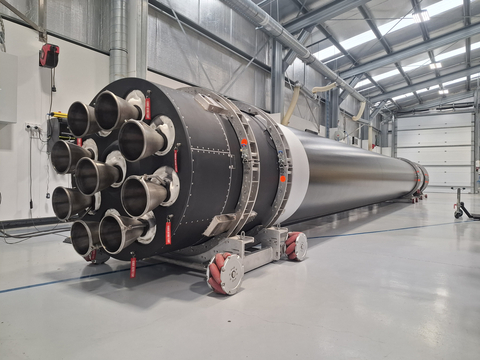Rocket Lab Sets Launch Date for 50th Electron Mission, Prepares to Deploy Five Satellites for Kinéis
Rocket Lab announced the launch window for its 50th Electron mission, 'No Time Toulouse,' set to begin on June 19, 2024, from New Zealand. The mission will deploy five IoT satellites for French company Kinéis, the first of five dedicated launches. Kinéis, backed by investors including CNES and CLS, aims to enhance global IoT connectivity with a new 25-satellite constellation. This milestone marks Rocket Lab's 50th Electron launch since its first in 2017 and will be broadcast live. The Electron rocket has become one of the most frequently launched U.S. rockets, with 190 satellites already deployed.
- Rocket Lab's 50th Electron launch is a significant milestone, showcasing their reliability and market presence.
- Deploying Kinéis' satellites enhances global IoT connectivity, representing a future revenue stream.
- The mission’s specific parameters provide Kinéis with greater control over launch schedule and deployment, differentiating Rocket Lab's services from larger rideshare missions.
- Rocket Lab's consistent launch record, with 190 satellites already deployed, strengthens their market position.
- The backing of Kinéis by CNES and CLS underscores the credibility and importance of the project.
- Rocket Lab’s ability to meet tailored mission requirements demonstrates technical capability and flexibility.
- The 50th launch will be a high-visibility event, potentially attracting more customers and investors.
- The reliance on a 14-day launch window poses potential delays that could affect project timelines and investor confidence.
- High dependency on the success of each dedicated launch for Kinéis' constellation could increase operational risks.
- The emphasis on meeting specific mission parameters increases technical complexity and potential for failure.
Insights
The milestone mission is the first of five dedicated launches to deploy a 25-satellite constellation for French Internet-of-Things company Kinéis

Rocket Lab's 50th Electron rocket in preparation for lift-off at Launch Complex 1 in
The ‘No Time Toulouse’ mission is scheduled to launch from Rocket Lab Launch Complex 1 in Mahia,
The mission is the first of five dedicated Electron launches for Kinéis, a company backed by private and public investors including the French government’s space agency CNES (Centre National d'Études Spatiales) and CLS (Collecte Localisation Satellites) an international space-based solutions provider, to improve global IoT connectivity. Kinéis’ new constellation will connect any object anywhere in the world and guarantee the transmission of targeted and useful data to users, in near-real time, with low energy consumption with more powerful 30kg-class nanosats that integrate IoT technology. The constellation also includes a second mission: a ship-tracking Automatic Identification System (AIS). Once deployed, these technologies will allow Kinéis to expand across multiple industries and scale from 20,000 devices connected to millions.
“The launch industry is not an easy or forgiving one. Making it to your first launch is not a given, so reaching 50 Electron launches is an enormous achievement and a rare feat in the history of spaceflight,” said Rocket Lab founder and CEO Sir Peter Beck. “I’m immensely proud of the team for bringing an industry-defining rocket to market, making frequent and reliable dedicated small launch a reality for the first time. We’re excited to launch Kinéis on this historic mission and grateful for the continued support of all the customers who have flown on Electron since our very first mission in 2017. Thank you for helping us to make Electron one of the most frequently launched rockets of all time.”
Kinéis CEO Alexandre Tisserant said: “Kinéis is proud and confident to entrust the deployment of its constellation to Rocket Lab. The Electron launcher meets our technical requirements for the positioning of five nanosatellites for each dedicated launch. Our teams and those of Rocket Lab are well coordinated to ensure the satellite separation phase with the launcher. We are very honoured that this first launch for Kinéis coincides with Electron's 50th flight!”
The ‘No Time Toulouse’ launch has been tailored specifically to meet Kinéis’ mission requirements, giving them greater control over launch schedule, orbit, and deployment parameters than would be possible on a larger rideshare mission. Tailored mission parameters for this launch include:
- Instantaneous launch window,
- After the first Curie engine burn to circularize the Kick Stage’s orbit, Curie will ignite again for an eight second burn to set a specific argument of perigee, enabling Kinéis to deploy five satellites to a precise location for each one of the five launches,
- All five satellites will be deployed in a precise sequence in singles and as pairs to build out the constellation exactly as Kinéis needs it,
- Finally, Curie will conduct a perigee lowering burn to reduce the Kick Stage’s orbital lifetime to keep space sustainable.
Electron’s 50th launch by the numbers.
The ‘No Time Toulouse’ mission will mark:
- 50th Electron launch since the Company’s first launch on May 25th, 2017.
- 499 Rutherford engines sent to space. Each Electron launch features 10 Rutherford engines, including nine on the first stage and a single vacuum optimized Rutherford engine on the second stage. Rocket Lab successfully flew a recovered Rutherford engine in 2023, hence 499 engines rather than 500.
-
46 missions from Launch Complex 1 in Mahia,
New Zealand . -
4 missions from Launch Complex 2 in
Virginia, USA . - 190 satellites launched by Electron.
- Eighth Electron mission of 2024.
The launch will broadcast live at www.rocketlabusa.com/live-stream
+ About Rocket Lab
Founded in 2006, Rocket Lab is an end-to-end space company with an established track record of mission success. We deliver reliable launch services, satellite manufacture, spacecraft components, and on-orbit management solutions that make it faster, easier, and more affordable to access space. Headquartered in
+ Forward Looking Statements
This press release contains forward-looking statements within the meaning of the Private Securities Litigation Reform Act of 1995. We intend such forward-looking statements to be covered by the safe harbor provisions for forward looking statements contained in Section 27A of the Securities Act of 1933, as amended (the “Securities Act”) and Section 21E of the Securities Exchange Act of 1934, as amended (the “Exchange Act”). All statements contained in this press release other than statements of historical fact, including, without limitation, statements regarding our launch and space systems operations, launch schedule and window, safe and repeatable access to space, Neutron development, operational expansion and business strategy are forward-looking statements. The words “believe,” “may,” “will,” “estimate,” “potential,” “continue,” “anticipate,” “intend,” “expect,” “strategy,” “future,” “could,” “would,” “project,” “plan,” “target,” and similar expressions are intended to identify forward-looking statements, though not all forward-looking statements use these words or expressions. These statements are neither promises nor guarantees, but involve known and unknown risks, uncertainties and other important factors that may cause our actual results, performance or achievements to be materially different from any future results, performance or achievements expressed or implied by the forward-looking statements, including but not limited to the factors, risks and uncertainties included in our Annual Report on Form 10-K for the fiscal year ended December 31, 2023, as such factors may be updated from time to time in our other filings with the Securities and Exchange Commission (the “SEC”), accessible on the SEC’s website at www.sec.gov and the Investor Relations section of our website at www.rocketlabusa.com, which could cause our actual results to differ materially from those indicated by the forward-looking statements made in this press release. Any such forward-looking statements represent management’s estimates as of the date of this press release. While we may elect to update such forward-looking statements at some point in the future, we disclaim any obligation to do so, even if subsequent events cause our views to change.
View source version on businesswire.com: https://www.businesswire.com/news/home/20240607234714/en/
+ Rocket Lab Media Contact
Morgan Connaughton
media@rocketlabusa.com
Source: Rocket Lab USA, Inc.







